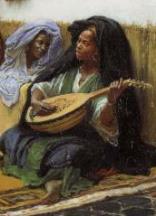About Ouds and Other String Instruments
The information below is what appeared on our old oud pages please note that the information is currently being expanded and revised. Some of the information below may not be accurate or may be outdated. Please be sure to check back at another time for the new content.
Caring for your oud is not terribly hard. Since an oud is made of wood you should treat it as you would treat a piece of wood furniture or a wood floor. Don't use any harsh cleaners on it or soaps just the occasional wipe down with a damp or dry cloth should keep the outside in fairly good condition. You should replace your strings if they break which can be done at most instrument repair shops or you can do it yourself if want... I've never been adventurous enough to try doing it myself I just fork over the dough and let someone else do it for me, especially since they tune it for me as well then. You should also make sure that your oud is properly tuned. Many repair shops may not be aware of the proper way to tune an oud and those that do know may not realize that there are differences in the tuning of an Egyptian Oud and a Turkish Oud. Many regions have their own tuning sequence and you should give them the specific tuning sequence that you want. Here are some common tuning sequences for ouds.
Egyptian Oud...
Turkish Oud...
You should however be carefull transporting this instrument since the neck is easy to break if you hit it against something.


